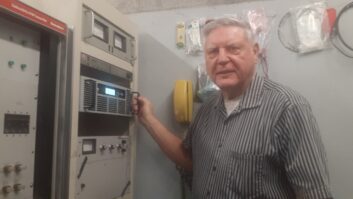The author is membership program director of the National Federation of Community Broadcasters. NFCB commentaries are featured regularly at www.radioworld.com.
It was recently announced that the Arkansas Educational Television Network launched a new service that will stream state legislative meetings and related state government gatherings. According to Arkansas Gov. Asa Hutchinson, “This [service] will give [the public] increased access to significant committee meetings, to commission meetings. I love the fact that some of our independent agencies will be under consideration for live-stream.”
This initiative is a wonderful example of how public media serves the needs of communities. Especially for young people, senior citizens and those who can’t otherwise get access to the municipal maze, broadcast of local government business is a great way to engage citizens and for lawmakers to demonstrate their commitment to voter involvement.
[Read: Community Broadcaster: Learning Together]
It is critical to note the latest effort in Arkansas is not unusual. So-called public, education and government (AKA PEG) media outlets have quietly provided such services for years. In big cities and small towns, community radio stations have aired hearings, meetings and city and state affairs for residents to tune in to in order to witness their representatives in action. No matter where you fall politically, we can all agree broadcast of these affairs in a net positive for a community and for democracy. Such programming is education at its best. For a young person to see how her or his city works is instructive. That child watching city council now could be your future mayor, after all.
Looming changes are prompting fears this kind of service could come to an end.
For many community media organizations, cable television franchise fees provide needed support. These fees are, in many ways, an extension of a broader practical understanding: that the airwaves belong to the public and, while we honor the free market, there should be educational programming and commitment from cable providers for core public services. Although such matters have been seemingly resolved for years, cable companies have often complained of the cost. Beyond the dollar amounts, some providers allege some communities expect a variety of other resources that end up costing the companies far more than franchise fees were supposed to be limited to.
In calling for reforms, the pro-industry Heartland Institute writes, “Local franchise authorities are of course free to request or demand ‘in kind’ services such as television service for municipal buildings or Wi-Fi hotspots in a public park, but the value of those contributions must count against the five percent cable television franchise fee cap. If not, the cap becomes completely meaningless something Congress never intended and would not accept.”
Years of campaigning for change may have won the day for industry. The FCC has proposed capping all fees to five percent, the current limit for franchise fees. Most crucial to point out is that in-kind donations, which have covered a plethora of items over the years, will be counted under the cap as part of the FCC’s consideration. For community media organizations like PEG television and radio, these changes mark a tectonic shift.

Some believe the FCC changes could be disastrous. Most media organizations already lost bids to tack fees onto internet services via cable providers as more people cut the cord and dropped cable in favor of streaming online. These outlets argued the franchise fee pool was already shrinking. The latest changes, media advocates suggest, make deeper cuts. As such, the FCC’s proposals are creating stress in media outlets nationwide.
Victor Locke, who oversees community media in Durango, Colo. said about the proposal. “This is an attempt by the industry to rewrite the rules so they don’t have to pay the franchise fees. We have eight buildings in the city that Charter Spectrum has to provide cable service to. Now that would be included [in the five percent]. This is like changing the rules in midstream. I think that’s really rubbing people the wrong way.”
One manager told his local press, “We provide all of the city council meetings, planning board meetings, Regional School Unit 1 meetings — this is one source where people can see for themselves on television what is being said. We give the whole thing. People get to see the entire meeting.” The changes, it is hinted at, could devastate the organization and effectively silence this valuable coverage.
No matter what happens, this debate is certain to continue. One can hope that all sides recognize the valuable place these media organizations play locally, and our shared desire for a rich, informed citizenry. All of us want the next generation to feel passionate and interested in leading their cities and states as well as the nation. Sustaining and expanding civic coverage will only benefit that goal.







